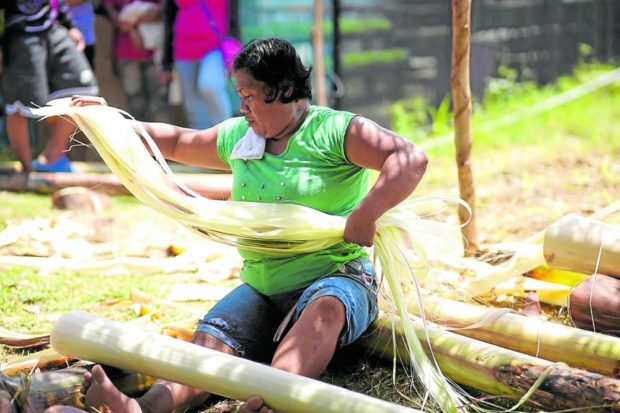
STRIPPER | A woman takes part in the abaca stripping competition on Wednesday during the restaging of the Abaca Festival held from May 24 to 30 in Catanduanes province after a two-year hiatus due to the coronavirus pandemic. (Photo courtesy of the Catanduanes Provincial Government)
LIGAO CITY—After two years of celebrating online due to coronavirus restrictions, the provincial government of Catanduanes celebrated the Abaca Festival with events attended by residents to pay tribute to the island province’s primary product.
With the theme “Uswag Abaca, Dagos sa Maogmang Isla” (Forward to Abaca, Welcome to the Happy Island), the weeklong fest, which started on May 24 and would end on May 30, was now on its sixth year.
Among the events of the festival was the Philippine Motorcycle Tourism, a 360-degree ride around Catanduanes held last Friday to showcase the beautiful scenery of the province. The event gathered over 130 riders from all over the country.
STRIPPER | Another contestant in the abaca stripping competition on Wednesday. (Photo courtesy of the Catanduanes Provincial Government)
The street dancing presentation, instead of the usual single event conducted in the capital Virac, was staged separately in the 11 towns of the province in observance of health and safety protocols, also on Friday.
“This time we reached out to the folks by going to the different municipalities [unlike the digital celebration last year and in 2020]. [We] did it mobile together with the judges and the participants of Philippine Motorcycle Tourism so it won’t be costly on the [contingents’] part and avoid the overcrowding situation [which could happen] if it will only be held in one place, particularly in Virac,” explained Provincial Tourism Officer Carmel Bonifacio-Garcia in a phone interview on Tuesday.
The festival also featured an abaca stripping contest and job, agriculture, business and trade fairs.
Top producer
STRIPPERS | Locals join the abaca stripping competition on Wednesday. (Photo courtesy of the Catanduanes Provincial Government)
Before the pandemic struck in March 2020, the Abaca Festival used to draw around 200,000 tourists to the island every year.
President Duterte, on April 22, declared Catanduanes as the abaca capital of the Philippines by virtue of Republic Act No. 11700, acknowledging the province as the country’s top producer of abaca fiber, or Manila hemp.
With the presidential declaration, Gov. Joseph Cua said tourism activities would be highlighted, more funding from the national government would be allotted for the development of the industry and more livelihood programs would be created for the more than 13,000 farmers in Catanduanes.
“A lot of Philfida (Philippine Fiber Industry Development Authority) projects and programs are in line for 2022, like the revitalization of abaca farms damaged by Typhoon ‘Rolly’ (international name: Goni) [in 2020], training on basic handloom hand weaving, creation of abaca provincial seed bank, mechanization, dryer and diagnostic laboratory,” said Cua, who won his reelection bid on May 9.
RELATED STORIES
192-year-old Catanduanes church back to old glory
Catanduanes ready for influx of tourists